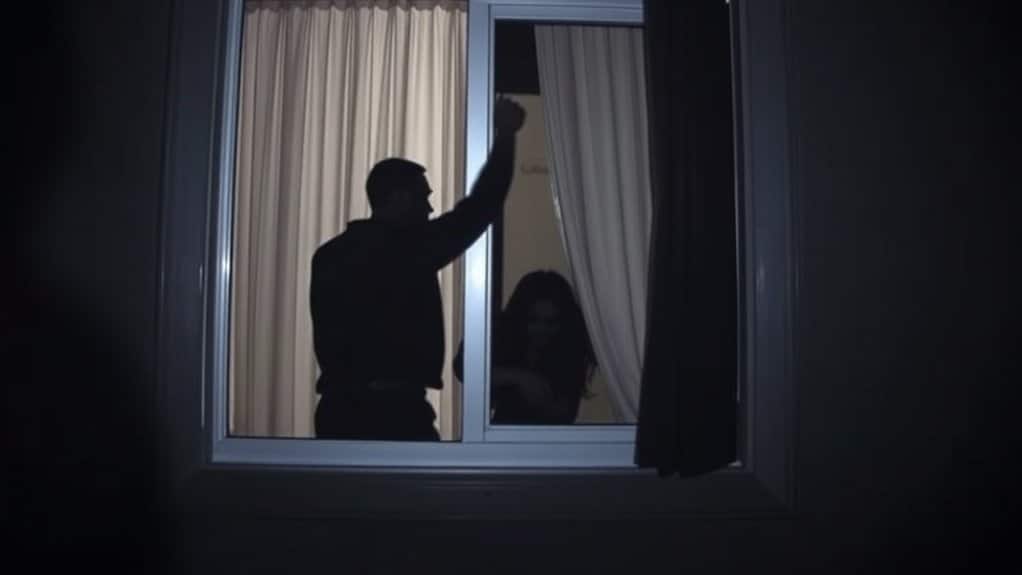Private investigators employ multiple methods to document domestic abuse cases effectively. They gather video and photographic evidence using surveillance equipment, systematically track communication patterns and threats, conduct thorough witness interviews, maintain detailed activity logs, and monitor social media platforms for digital evidence. These specialized techniques help build inclusive case files that support victims seeking legal protection, custody rights, or criminal prosecution. Understanding these investigative approaches reveals powerful tools for addressing domestic violence situations.
Key Takeaways
- Private investigators gather high-resolution video and photo evidence to document physical abuse, threats, and protective order violations.
- Investigators collect and analyze digital communications like texts, emails, and social media posts to establish patterns of harassment.
- They conduct strategic witness interviews with neighbors, family, and coworkers to build credible testimonies for court.
- Investigators perform surveillance operations to document stalking behavior and create detailed activity logs of abuser actions.
- They monitor social media platforms to capture threatening posts, location data, and online harassment that proves abuse patterns.
Gathering Video and Photographic Evidence

When domestic abuse victims seek justice, private investigators employ sophisticated surveillance techniques to capture irrefutable visual evidence. Using high-resolution cameras and discreet recording devices, investigators document instances of physical aggression, threatening behavior, and violations of protective orders.
Video surveillance allows investigators to establish patterns of abuse by recording incidents from safe, strategic positions. They capture footage of confrontations outside homes, workplaces, or during child custody exchanges. Through careful photographic documentation, investigators preserve evidence of injuries, property damage, and stalking behaviors. They maintain detailed logs correlating images with dates, times, and locations.
These visual records strengthen victims’ cases by providing courts with compelling proof that validates their testimonies. The evidence gathered often becomes vital in securing restraining orders and pursuing criminal charges against abusers. With licensed private investigators conducting professional and ethical surveillance, victims can be assured their evidence will be admissible in court.
Documenting Communication Patterns and Threats
Private investigators meticulously track and analyze communication patterns between alleged abusers and victims to establish clear evidence of harassment, coercion, or threats. Through systematic text message analysis, investigators document the frequency, timing, and content of communications, revealing patterns of controlling behavior or escalating hostility.
Investigators employ specialized software to preserve digital exchanges, including emails, social media messages, and voicemails. This technology assists in threat identification by categorizing messages based on severity and creating extensive timelines of abuse. They also monitor changes in communication styles that may indicate mounting aggression or manipulation tactics.
The documentation process includes recording instances of love bombing, gaslighting, or intimidation attempts, providing courts with tangible evidence of psychological abuse that might otherwise go undetected in domestic violence cases. Professional investigators can retrieve and analyze call detail records to establish patterns of stalking or harassment through phone communications.
Interviewing Witnesses and Establishing Timelines
Through extensive witness interviews, investigators reconstruct detailed timelines of domestic abuse incidents while gathering essential testimonies from neighbors, family members, and coworkers who may have observed signs of violence or controlling behavior.
Private investigators carefully document witness statements, cross-referencing accounts to establish timeline accuracy and identify patterns of abuse that may have gone unreported. They conduct interviews sensitively, understanding that witnesses often hesitate to come forward due to fear or uncertainty. By piecing together multiple perspectives, investigators create thorough chronologies that reveal escalating behaviors and critical incidents. These detailed timelines, supported by corroborated witness testimony, provide courts with reliable evidence of systematic abuse. The methodical collection and organization of witness accounts helps strengthen cases by demonstrating the recurring nature of domestic violence.
Their licensed investigators utilize specialized tools and resources to ensure all collected evidence remains admissible in court proceedings.
Conducting Surveillance and Activity Logs

During domestic abuse investigations, systematic surveillance operations and detailed activity logs provide essential documentation of perpetrator behaviors, victim interactions, and potential violations of protective orders. Private investigators maintain thorough records of an alleged abuser’s movements, capturing time-stamped photos, videos, and written observations that can establish behavioral patterns and support legal proceedings.
Through meticulous activity tracking, investigators document instances of stalking, harassment, or attempts to contact the victim in violation of court orders. They record the subject’s daily routines, frequent locations, and interactions with others. This surveillance data helps create a clear picture of the perpetrator’s actions and intentions, particularly when abuse occurs in private settings. The collected evidence strengthens protection order applications, custody cases, and criminal prosecutions while providing victims with verified documentation of their experiences. Working with licensed private investigators ensures confidential handling of sensitive cases while maintaining admissible evidence standards for court proceedings.
Building Digital Evidence Through Social Media Monitoring
Social media platforms provide investigators with a rich source of digital evidence in domestic abuse cases, complementing traditional surveillance methods. Private investigators carefully monitor social media trends and online behavior patterns while remaining mindful of privacy implications and legal boundaries.
Key areas investigators focus on include:
- Documenting threatening posts, messages, or comments that demonstrate patterns of harassment or intimidation
- Collecting screenshots of location check-ins and timestamps that could establish timeline inconsistencies or violations of protective orders
- Preserving evidence of social connections and interactions that might reveal witness accounts or support networks
Through systematic monitoring of digital footprints, investigators can build compelling evidence portfolios that strengthen domestic abuse cases. This approach requires meticulous attention to detail and proper documentation to guarantee all gathered evidence meets legal admissibility standards. Investigators employ language sentiment analysis to identify subtle patterns of psychological abuse and manipulation in online communications.
Frequently Asked Questions
How Much Does It Cost to Hire a Private Investigator for Domestic Abuse Cases?
Private investigator fees comparison shows costs ranging from $50-250 per hour, with service packages starting at $500-3000 depending on case complexity, location, evidence gathering requirements, and surveillance duration.
Can Private Investigators Testify in Court About Domestic Abuse Evidence They Collect?
Licensed private investigators can provide court testimony and their properly documented evidence holds legitimacy in legal proceedings when collected within lawful guidelines and professional investigative standards.
How Long Does a Typical Domestic Abuse Investigation Take to Complete?
Investigation timelines typically range from 2-8 weeks, depending on evidence collection complexity, witness availability, and documentation requirements. Some cases conclude sooner, while complex situations may require extended monitoring.
Are Private Investigators Required to Report Domestic Abuse to Law Enforcement?
Private investigators must balance confidentiality obligations to clients with ethical considerations. While not legally required to report abuse, many choose to alert authorities if imminent danger exists, especially involving minors.
What Legal Limitations Do Private Investigators Face When Investigating Domestic Abuse?
Private investigators must adhere to investigator ethics and evidence legality restrictions, including avoiding trespassing, unauthorized surveillance, wiretapping, or accessing private records without proper consent or legal authority.
Conclusion
Private investigators serve as essential documentation specialists in domestic abuse cases, methodically building extensive evidence portfolios through surveillance, witness testimony, digital monitoring, and precise record-keeping. Their systematic approach helps establish patterns of behavior, validate victim accounts, and create legally admissible documentation. This thorough investigative process often provides the concrete evidence necessary for legal proceedings, protective orders, and successful prosecution of domestic abuse cases.






